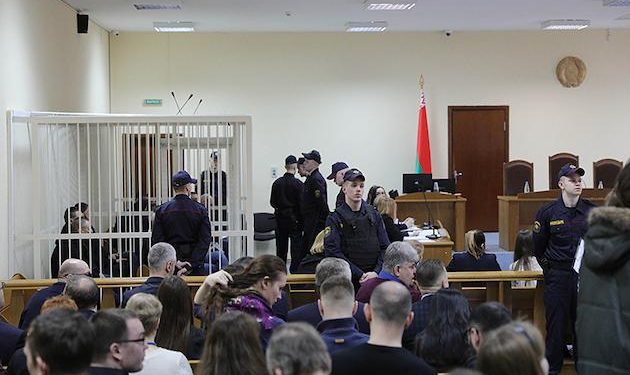- Belarusia has disbarred 23 lawyers in the past year who represented dissidents, according to the International Federation for Human Rights
- Belarusian lawyer Mikhail Kirilyuk, 38, who has defended anti-government protesters and publicly criticized President Alexander Lukashenko, said he received a text message in October urging him to leave the country
- Belarusian authorities began a crack down on dissent in August 2020, targeting opposition politicians, activists and the media, while some 23 Belarusian lawyers have been disbarred since last summer,
MINSK, Belarus: Belarus has disbarred 23 lawyers in the past year who represented dissidents, according to the International Federation for Human Rights (FIDH).
Others have been pressured to leave the country.
Belarusian lawyer Mikhail Kirilyuk, 38, who has defended anti-government protesters and publicly criticized President Alexander Lukashenko, said he received a text message in October urging him to leave the country.
Kirilyuk told Reuters that the text, which was sent by someone linked to the country’s security services on an encrypted messaging app, warned that he faced arrest and the revocation of his law license.
After receiving the warning, Kirilyuk left Belarus that month with his parents and young children for Poland, which has been critical of Lukashenko.
In a press release in February, the Belarusian Justice Ministry said Kirilyuk had made “unacceptable” public statements that contained “rude” and “tactless” comments about unnamed state representatives.
Speaking with Reuters from Warsaw, Kirilyuk said he believed the action against him was politically motivated because of who he had represented and his critical public comments.
The experience of Kirilyuk and several other Belarusian lawyers are part of a pattern of intimidation and suppression of lawyers by Belarusian authorities, according to international organizations representing the legal profession and human rights groups.
Reuters also spoke to seven lawyers who confirmed their licenses were revoked after defending protesters and speaking out against authorities but was unable to independently corroborate their assertions or the text message described by Kirilyuk.
Lukashenko’s office has not responded to Reuters’ requests for a comment, but the Justice Ministry told the agency its oversight of the legal profession is in line “with the principle of independence of advocacy and non-interference in the professional activities of advocates.”
Belarusian authorities began a crack down on dissent in August 2020, targeting opposition politicians, activists and the media, while some 23 Belarusian lawyers have been disbarred since last summer, according to the International Federation for Human Rights (FIDH).
In June, Lukashenko, 66, approved a new law stipulating only candidates approved by the Justice Ministry can practice law.
The United Nations said Belarusian lawyers handling politically sensitive human rights cases have been harassed and intimidated, and in May a report by its Special Rapporteur on Human Rights in the country said interference in the work of lawyers is “systematic.”
In response, Belarus stressed that the UN’s decisions have long “failed to reflect the real human rights situation in the world” and “served as a pretext for pressure and sanctions of the collective West against states that do not obey its diktats.”






